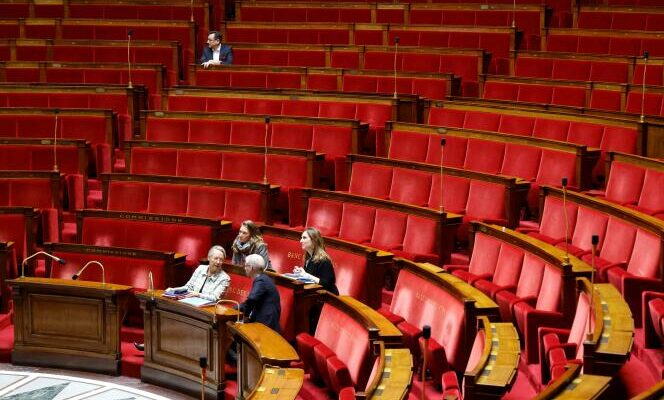The Social Security budget for 2024 was definitively adopted on Monday December 4 by Parliament, after the rejection in the National Assembly of a final motion of censure against the government tabled by left-wing deputies. A response to Elisabeth Borne’s last resort to 49.3 to pass this text without a vote, the motion only received 108 votes out of the 289 required to bring down the government.
“You know that these 49.3 are necessary, but you pretend, you act indignant”, launched the Prime Minister in an almost deserted Hemicycle, blaming the truncated debates on oppositions refusing, according to her, dialogue. This Social Security financing bill (PLFSS) “is a text of social progress”argued Mme Terminal, boasting “a budget of 640 billion euros for our Social Security”.
Without convincing the left, which had put its divisions on hold to denounce in a unitary motion a “passage by force” concerning a text which “unravels Social Security and brutalizes our public hospital and its caregivers”. “You shamelessly bullied Parliament”launched the socialist Arthur Delaporte. “You waved the red rag of the public deficit to better justify budget cuts, savings and investment failures” in health, added the “rebellious” MP Ségolène Amiot.
Expenditure up 3.2%, deficit of 10.7 billion euros
Although they also contest the text, the other opposition groups did not vote for the motion of censure. For the National Rally (RN), the text does not respond to the “major public health issues in the territories”. But “your systematic approach to submitting motions of all kinds is tiring”, launched RN deputy Christophe Bentz to the left. The right, for its part, rules out censoring the government over a budgetary text. The Republican deputy (LR) Yannick Neuder, however, castigated a PLFSS “far from the mark”citing the “unfilled positions in public hospitals” or even the “alarming mental health situation”.
The Senate, dominated by the right, had for its part adopted a largely revised version of this budget, contesting a financial trajectory considered unrealistic. But the government rejected most of its additions. This financing bill provides for expenditure increasing by 3.2% in 2024 compared to 2023, to 254.9 billion euros. The “Secu” deficit, set at 8.8 billion euros in 2023 then at 10.7 billion in 2024, according to the latest government forecasts, could reach 17.5 billion by 2027.
Certain economic measures particularly anger opposition, such as the possibility of suspending an insured person’s benefits when a doctor mandated by the employer judges his work stoppage to be unjustified. Other PLFSS measures are more consensual, such as free condoms for those under 26 or the reimbursement of reusable periodic protection for women under 26. In order to curb the loss of revenue linked to exemptions from contributions, the government adopted a proposal from its majority freezing the thresholds for the highest eligible salaries. A measure considered too timid by the left.
Two files also fueled parliamentary debates, without appearing in the text. After threatening a drain on the reserves of the Agirc-Arrco supplementary pension plan, managed by the social partners, the government ended up backing down. Without giving up asking for this scheme to participate in the revaluation of small pensions, the executive decided to rely on negotiations between employers and unions. The possible increase in medical deductibles and flat-rate contributions for policyholders, envisaged by the government without being formalized in this budget, also fueled the discussions. “The decision has not been made”assured the Minister of Health, Aurélien Rousseau.
